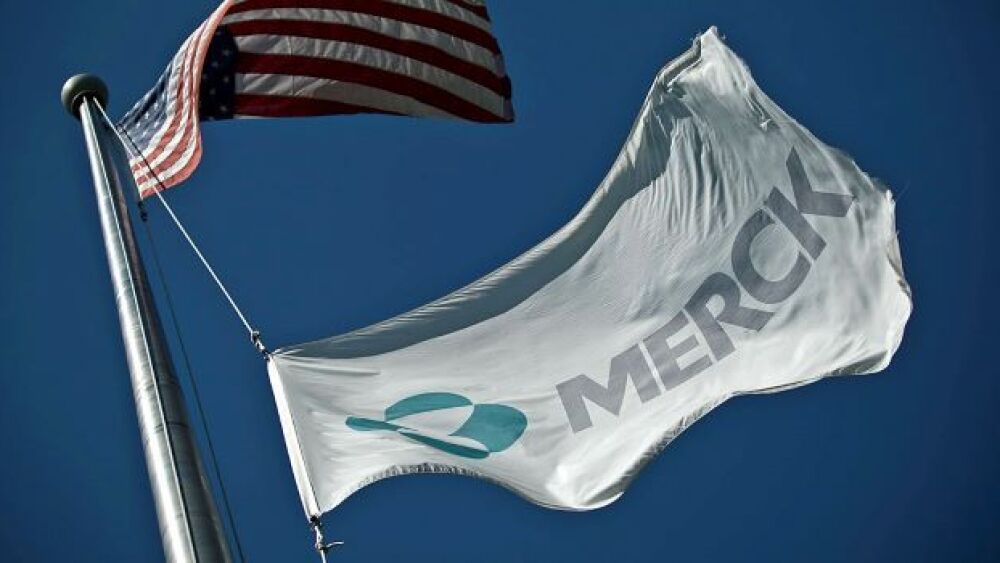The Phase III trial on a potential treatment for mild-to-moderate COVID-19 symptoms by Merck and Ridgeback Biotherapeutics showed promise in preventing hospitalizations and death.
Kena Betancur/Getty Images
Interim results from the Phase III trial of a potential treatment for mild-to-moderate COVID-19 symptoms by Merck and Ridgeback Biotherapeutics showed promise in preventing hospitalizations and death.
Initial analysis from the Phase III MOVe-OUT study on investigational oral antiviral drug molnupiravir (MK-4482, EIDD-2801) shows a significantly reduced risk for hospitalization and death in adult patients by about 50%. Through Day 29, only 7.3% of the participants were either hospitalized or died, compared to the 14.1% who received a placebo. No deaths were reported in the molnupiravir group, as opposed to the eight in the placebo group.
The results were based on data from 775 patients enrolled in the trial. To qualify for the study, the patients had to have laboratory-confirmed mild-to-moderate COVID-19, with symptom onset within five days of the study randomization. All patients were required to have at least one risk factor linked with poor disease outcomes. Aside from reduced hospitalization and death risks across all subgroups, the preliminary results also demonstrated consistent efficacy against viral variants Delta, Gamma, and Mu.
With these results, an independent Data Monitoring Committee sought the approval of the U.S. Food and Drug Administration (FDA) to halt further recruitment into the trial. The next step now would be for Merck to submit an Emergency Use Authorization application to the FDA and marketing applications to other regulators worldwide.
“More tools and treatments are urgently needed to fight the COVID-19 pandemic, which has become a leading cause of death and continues to profoundly affect patients, families, and societies and strain health care systems all around the world. With these compelling results, we are optimistic that molnupiravir can become an important medicine as part of the global effort to fight the pandemic and will add to Merck’s unique legacy of bringing forward breakthroughs in infectious diseases when they are needed most,” said Robert M. Davis, chief executive officer and president of Merck, in a statement.
In fact, because of its high confidence in molnupiravir’s potential, Merck has been producing the drug at risk. The company expects to manufacture 10 million courses of treatment by the end of this year, with more doses to be produced in 2022. Merck also signed a procurement agreement with the U.S. Government early this year, which allows it to supply some 1.7 million courses of the drug to the government upon EUA or the FDA’s approval. It has also entered into supply and purchase deals with other governments worldwide.
Another notable move to demonstrate Merck’s commitment to making molnupiravir accessible to everyone is a non-exclusive voluntary licensing agreement with generic manufacturers to distribute the drug in over 100 low- and middle-income countries (LMICs). All these are contingent on local regulatory EUAs and approvals.
Laurent’s Oral COVID-19 Drug Could Help Moderate-to-Severe Patients
Topline results from the Phase II RESOLUTION trial of Laurent Pharmaceuticals’ once-daily oral COVID-19 drug, LAU-7b, showed effectiveness against death and disease progression in moderate-to-critical patients, though it failed to achieve its overall primary endpoint where the total involved those who were critically ill.
The trial tested the efficacy and safety of LAU-7b for 14 days in a total of 232 hospitalized patients,148 of whom had moderate-to-severe disease that did not require oxygen and 84 who were critically ill, requiring high-flow oxygen but not mechanical ventilation.
While the drug failed to reach its primary endpoint of improving the total percentage of patients kept alive and free of respiratory failure by Day 29 – the numbers were 69.2% in the treatment group versus 72.2% in the placebo – LAU-7b (plus standard of care) demonstrated a 100% reduction in risk of all causes of death and progression to mechanical ventilation in moderate-to-severe patients by Day 60. None of those who were treated with LAU-7b plus SoC died or required a machine, compared to the placebo group where four died and five progressed to mechanical ventilation.
Although the overall outcome is a setback for Laurent, the company said it would focus its future development on patients with moderate-to-severe disease instead, as well as the key endpoints that delivered significant benefits.
“The results from the moderate-to-severe subgroup are very promising, suggestive of a potential clinical benefit of LAU-7b in COVID-19 patients that are not yet in respiratory failure, which also represents the patient population with the fewest treatment options. An oral therapeutic that prevents serious COVID-19 illness and death, also allowing patients to continue the treatment at home after discharge from hospital, would be a powerful tool in the therapeutic arsenal against COVID-19,” commented Laurent President and CEO Dr. Radu Pislariu, M.D.
LAU-7b is an oral form of fenretinide that was initially developed for its potential to trigger the resolution phase of inflammation, a natural mechanism that controls inflammatory response, without inducing immune suppression. Fenretinide was recently shown to have antiviral properties against SARS-CoV-2 in vitro, especially when combined with remdesivir. In addition to its COVID-19 links, LAU-7b is also being evaluated as a potential treatment for cystic fibrosis.





